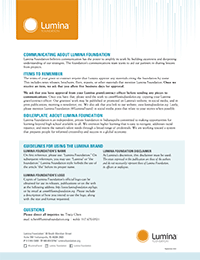What programs or activities does the Foundation NOT fund?
- Partisan political or lobbying efforts (in compliance with the Internal Revenue Code)
- Direct service programs, especially those of small scale, including:
- Workforce training
- Summer bridge programs for high school and college students
- English as a second language courses
- GED or other test preparation
- Literacy training
- Social/human services
- Discipline-specific programs or the creation of new degree programs
- Curriculum development
- Graduate-level or professional programs
- Research that is not directly applicable to our strategic outcomes
- Institution-specific projects not explicitly designed to stimulate change at a systemic level
- Individual scholarships or institutional scholarship programs
- Capital campaigns and endowments
- Requests exclusively for equipment, such as technology hardware and software
- Corporate sponsorships and fundraising events outside Indianapolis, Indiana
- Religious activities
- K-12 education reform
- Teacher education and training
- Tutoring or mentoring
- Meetings and conferences, unless they relate to a Foundation program
Why are you no longer funding certain areas or types of work?
As the foundation refines its strategic approach, we are not as focused on developing or replicating specific programs as we have been in the past. Instead, we are focused on creating an environment in which effective practices are explicitly connected to policies that support systemic change.
Is a project that affects thousands of students considered broad-based?
Driving progress toward the goal will require work at all levels. However, given limited foundation resources, we seldom fund unsolicited proposals not explicitly designed to yield systemic, large-scale, or nationwide impact. For example, programs bringing thousands of students to a quality credential in a city may be considered if there are explicit strategies for replication across multiple cities targeting systemic change.
Communicating about Lumina Foundation
Lumina Foundation believes communication has the power to amplify its work by building awareness and deepening understanding of our strategies. The foundation’s communications team wants to aid our partners in sharing lessons from projects.
Learn More